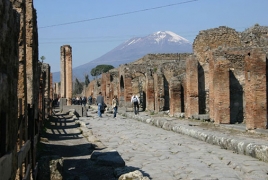Romans melted iron to repair streets before Vesuvius erupted May 16, 2019 - 17:23 AMT PanARMENIAN.Net - Ancient workers used molten iron to repair Pompeii's streets before the historic and devastating eruption of Mount Vesuvius in A.D. 79, a team of archaeologists has discovered, Live Science reports. The discovery reveals a previously unknown method of ancient Roman street repair and represents "the first large-scale attestation of the Roman use of molten iron," wrote researchers Eric Poehler, a classics professor at the University of Massachusetts Amherst; Juliana van Roggen, an independent researcher; and Benjamin Crowther, a doctoral student at the University of Texas at Austin, in a paper recently published in the American Journal of Archaeology. When Mount Vesuvius erupted, it covered the city in ash and lava; though the eruption killed many of Pompeii's inhabitants, it also preserved the city in time. Many of Pompeii's streets were paved with stone, but during a survey in July 2014, archaeologists found that over time, the passage of carts eroded those stones to form deep holes, or ruts. Repaving streets was an expensive and time-consuming process, historical records and archaeological remains show. "One option for repair, complete repaving in stone, was a difficult and expensive endeavor that might block important through-routes in a city for months," the researchers wrote in their paper. This posed a problem for the people of Pompeii, since some of the city's many streets could become eroded quickly. "Investigations at Pompeii have shown that particularly high volumes of traffic concentrated in narrow streets could wear down even a stone-paved surface in only a few decades," the researchers wrote. The team found that "the Pompeians devised another option [for street repair] that was ingenious and unconventional: after heating iron or iron-rich slag to a molten state, they poured out hundreds of individual repairs onto, into and below the paving stones of the city's most important streets," the researchers wrote. After the molten iron was poured, it filled the holes and hardened as it cooled down. In addition to iron, other materials such as stone, ground-up pieces of terracotta and ceramics were also inserted into the holes to help fill them up. This method of repair was cheaper and faster than repaving a street, researchers found. Authorities said a total of 192 Azerbaijani troops were killed and 511 were wounded during Azerbaijan’s offensive. In 2023, the Azerbaijani government will increase the country’s defense budget by more than 1.1 billion manats ($650 million). The bill, published on Monday, is designed to "eliminate the shortcomings of an unreasonably broad interpretation of the key concept of "compatriot". The earthquake caused a temporary blackout, damaged many buildings and closed a number of rural roads. Partner news |